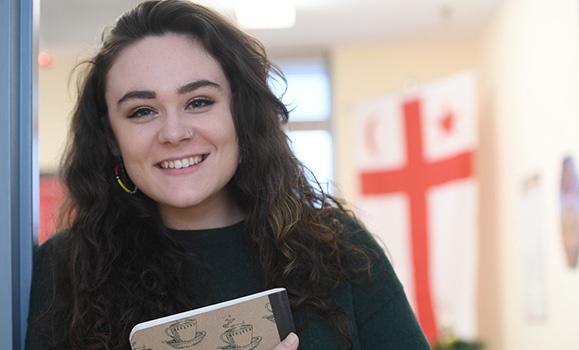For Mercedes Peters, exploring history is an exercise that shines as much light on the present as it does on the past.
‚ÄúI've always been interested, as a Mi'kmaq woman, in the effects that Indian assimilation policy has had on Indigenous people,‚ÄĚ says Mercedes. ‚ÄúIt's why I think history as a field is so important; it's not all about dusty books and spending a lot of time stuck in the past. A lot of what I do informs my understanding of the present day.‚ÄĚ
Mercedes is in the first year of her master’s degree program in History. Her research focuses on the impact of the Indian Act on Mi’kmaq women, in particular a clause that, until 1985, removed the Status Indian designation from Indigenous women who married or had children with a non-Indigenous person, a non-Status Indian, or did not disclose the identity of the father on their child’s birth certificate.
Mercedes explains that her research includes examining the assimilation policies that the Canadian government put in place which put women and children at a disadvantage. The legacies of these policies have contributed many of the issues we see in Canada today, such as the National Inquiry Into Missing and Murdered Indigenous Women and Girls.
Issues of identity
Her research includes looking at how the removal of status, access to treaty rights and in many situations, community and familial ties, affected the identity of Indigenous women‚Äďin particular Mi'kmaq women.
‚ÄúMy focus on the Mi'kmaq doesn't just come from the fact that I am Mi'kmaq. It stems from the fact that historians don't really focus on us much after Confederation,‚ÄĚ she says. ‚ÄúColonization in the west happened later and with a great deal more violence after 1867, so histories that cover post-Confederation Indigenous groups tend to gloss over us.
‚ÄúI think we're missing an important opportunity to look at how colonization has affected Indigenous groups differently. After all, just as Indigenous people are not a single, homogeneous group, nor are their experiences with colonialism.‚ÄĚ
Jerry Bannister is Mercedes‚Äô thesis supervisor. ‚ÄúMercedes's MA thesis deals with one of the most criticalŐżareas of historical research in Canada today,‚ÄĚ he says. ‚ÄúHer research not only willŐżmake an important contribution to Indigenous communities, but will alsoŐżhave significant policy implications."
In addition to her busy academic life, Mercedes also spends a great deal of time doing community work. She works as a student project coordinator with the Aboriginal Student Centre on campus andŐż as a regional representative with a national non-profit Indigenous scholarship program called Indspire, an organization that works to help Indigenous students through funding and mentorship opportunities.
She is also a Youth Reconciliation Leader with the Halifax team of the Canadian Roots Exchange (CRE), an organization that facilitates workshops and educational events promoting reconciliation between Indigenous and non-Indigenous youth across the country.
Beyond the classroom
Mercedes sees a strong connection between the historical research she does in her program and the work she does in her life outside academia.
‚ÄúEducation is something that is extremely important to me,‚ÄĚ says Mercedes. ‚ÄúI think that's why I've dedicated my career to doing research, but it's why I also spend a lot of my free time working on reconciliation initiatives and teaching others about the legacy of a history of colonial oppression, how we can see its effects in our world now, and how we can work to remedy them.‚ÄĚ
Őż
Mercedes is just one of many Faculty of Arts and Social Sciences students who take their education beyond the classroom for the good of society. Learn about some more FASS students who are also using experiential learning to leave a lasting impact.

